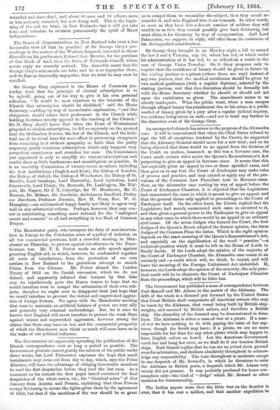An unexpected obstacle has arisen to the progress of the
Alexandra case. It will be remembered that when the Chief Baron refused to sign the bill of exceptions tendered by the Crown, he suggested that the Attorney-General should move for a new trial ; and on its being objected that there would be no appeal from the decision of the Court on motion, inasmuch as this was a Revenue case, the Court made certain rules under the Queen's Remembrancer's Act purporting to give an appeal in Revenue cases. It seems that this Act expressly gives an appeal in two or three specified cases, and then goes on to say that the Court of -Exchequer may make rules of process and practice, and may extend or apply any of the pro- visions of the Common Law Procedure Acts to Revenue cases. Now, on the Alexandra case coming by way of appeal before the Court of Exchequer Chamber, it is objected that the Legislature had enumerated the cases in which it meant to give an appeal, and that the general clause only applied to proceedings in the Court of Exchequer itself. On the other hand, the Crown replied that the Legislature had merely enumerated such cases as occurred to it, and then given a general power to the Exchequer to give an appeal in any other cases in which there would be an appeal in an ordinary civil cause. Of the seven Judges who formed the Court, the four Judges of the Queen's Bench adopted the former opinion, the three Judges of the Common Pleas the latter. Which is the right opinion depends on the exact meaning of the Queen's Remembrancer's Act, and especially on the signification of the word " practice "—a technical question which it must be left to the House of Lords to finally decide. If the Lords adopt the opinion of the majority of the Court of Exchequer Chamber, the Alexandra case comes to an untimely end—a result which will, we think, be unjust, and will leave the meaning of the Foreign Enlistment Act undecided. If, however, the Lords adopt the opinion of the minority, the only prac- tical result will be to eliminate the Court of Exchequer Chamber from the proceedings, which will be little loss.






























 Previous page
Previous page